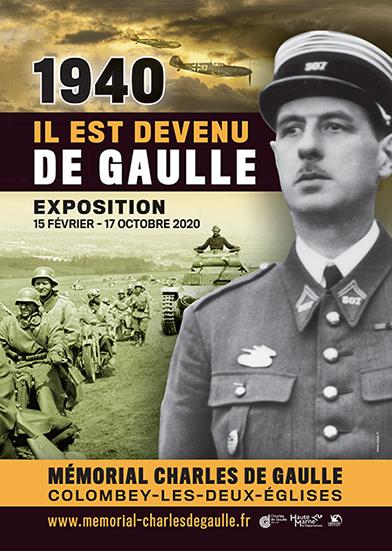2020: “De Gaulle Year”
2020 marks a Charles de Gaulle triple anniversary. So many opportunities to celebrate the first of the Free French, recall his life of commitment or gain a better grasp of the repercussions, right up to the present day, of the call to arms of 18 June 1940.

Charles de Gaulle is without doubt the contemporary historical figure best known to French people. And his “Call to Arms” has become a subject of remembrance more than ever in this “De Gaulle Year”, 2020, marked by a triple anniversary – 130 years since his birth, 50 years since his death and 80 years since the Call to Arms. How to explain the growing significance of his speech over time? Beyond the Call to Arms, what does de Gaulle’s message represent today?
“Keeping the General’s memory alive”?
At a time when the surviving contemporaries of de Gaulle are becoming fewer and fewer, there is a growing discussion around the issue of passing on his legacy. The only national institution recognised by the State for keeping alive the memory of General de Gaulle, the Charles de Gaulle Foundation is at the forefront of this issue. It launched an initial response to this question several years ago, by focusing on young people: educational activities play an increasingly important role at the Foundation, through a partnership with the Ministry of National Education and Youth. In this way, it ties in with the General’s personal story: to de Gaulle, education was a priority.
Educating young people is thus one of the Foundation’s four areas of activity, together with university research and policy reflection, outreach work with the general public, and support for raising France’s global profile. The projects for 2020 ought to shed light on these dynamic approaches to de Gaulle’s legacy, by going beyond remembrance policy. To that end, the Charles de Gaulle Foundation is working with multiple actors, including government ministries (Armed Forces, National Education and Youth), foundations (Order of Liberation, Free France, Marshal Leclerc) and the regions (Hauts-de-France, Grand Est).
A commemorative season
Symbolic sites and dates will take centre stage: the Gaullian sites of the Charles de Gaulle Foundation occupy an important place in the remembrance calendar. Construction has got under way of the Charles de Gaulle Institute in Lebanon. The department of Nord, in conjunction with the Charles de Gaulle Foundation and the Fondation du Patrimoine, has launched a national subscription to help fund the renovation of the house of de Gaulle’s birth, number 9 rue Princesse: it is scheduled to reopen on 22 November, the 130th anniversary of the General’s birth. The Musée de l’Armée fits into this process: both a major museum of military history and a “major Gaullian site”, in 2020 the museum will present the public with a renovated Historial Charles de Gaulle, including redesigned rooms devoted to the Second World War: the exhibition Comme en 40 (Like in 1940) will run there from April to July 2020.
Colombey-les-Deux-Églises will be at the centre of the 9 November celebrations to mark the 50th anniversary of the General’s death. Young people will be heavily involved: this is an opportunity to put commitment back among the essential values of the Republic. De Gaulle was a lone individual who made use of his freedom to say no. That message will be brought to the fore at another high point of 2020: the commemoration of the student demonstration of 11 November 1940 in Place de l’Étoile, Paris, the first example of public opposition to the occupation and the only student protest until 1944.
A highly symbolic site will be at the heart of the ceremonies commemorating the call to arms of 18 June: the island of Sein, in honour of the 128 islanders who were among the very first French people to join General de Gaulle in London in June 1940. The presence of these sailors at the General’s side led him to say that the little island represented “a quarter of France”; on the other side of the English Channel, London will echo this tribute. The ceremonies will give a special place to the city from which de Gaulle made his appeal; in the context of Brexit, that choice is intended to carry a message: that history brings people together more than it divides. The capital of European resistance to Nazism bore witness to that fact.
Understanding and assimilating de Gaulle
Besides these events linked to the remembrance calendar and to sites emblematic of Charles de Gaulle’s life, 2020 will see a number of editorial and documentary, audiovisual, arts (theatre productions of Meilleurs Alliés and Le Crépuscule) and educational projects (the theme of the 2019-20 Concours National de la Résistance et de la Déportation schools competition is “1940, joining the Resistance: understanding, refusing, resisting”). Scientific aspects will also be present, with the organisation of symposiums. In particular, the Foundation will be holding a seminar to discuss de Gaulle’s contribution to defining France’s place in the world today. It will question the foreign policy decision-making strategy and interrogate the ambitions and means of power. Entitled “De Gaulle and the open sea: a global ambition for France, past and present”, the seminar has its opening day at the French Senate on 13 January 2020.
Thus, 2020 will not be focused on the past: it is not just about commemorating de Gaulle’s death. It will be an opportunity to think about his legacy and how it can be passed on. We must turn to young people to show just how topical the issues associated with de Gaulle are: the foundations of present-day France, in terms of foreign policy, the economy, national defence or institutions, can be found in his work. The independence and greatness of France are ideas that guided his politics. Gaullism was born of the refusal to accept defeat and the call to arms of 18 June certainly amounted to a turning point and a founding act. De Gaulle’s legacy can also be looked at from the angle of modernity, a condition for independence. But it can also be measured in terms of the Gaullian message: as individualism gains ground and values become muddled, the concept of commitment regains all its meaning – and who better than the General to embody this commitment that involves people in a shared history? It is that shared history – “a source of new passions” – which must be understood and pursued in order to better assimilate it. The challenge for 2020, “De Gaulle Year”, could be to see a shift from passing on his legacy to making it our own.
Read more
Articles of the review
-
The file
1940: Answering the Call
The call to arms of 18 June is today considered the founding act of the Resistance, but the movement was slow to find its way in the early days and in 1940 consisted purely of individual initiatives. That said, 1940 was definitely when the first pockets of resistance were formed and the symbol of th...Read more -
The figure

The Historial Charles de Gaulle
To mark the 80th anniversary of De Gaulle’s call to arms of 18 June 1940, the Musée de l’Armée has completely revamped the Historial Charles de Gaulle to offer visitors a considerably enhanced museum experience.
Read more -
The interview

Rear Admiral Luc Pagès
Rear Admiral Luc Pagès is defence attaché at the French Embassy in London. He acts as intermediary for French remembrance policy in the United Kingdom. For the 80th anniversary of 1940, he is organising a series of cultural and educational events.
Read more

